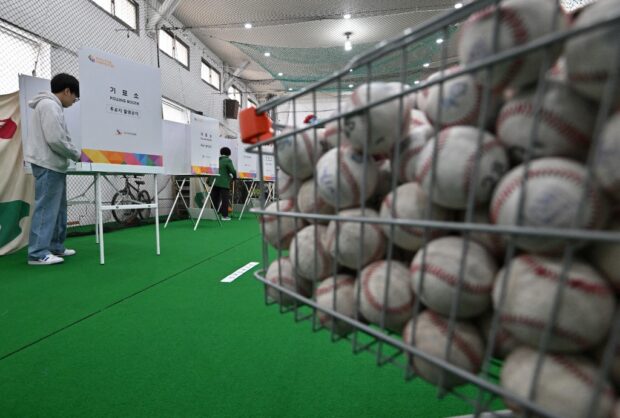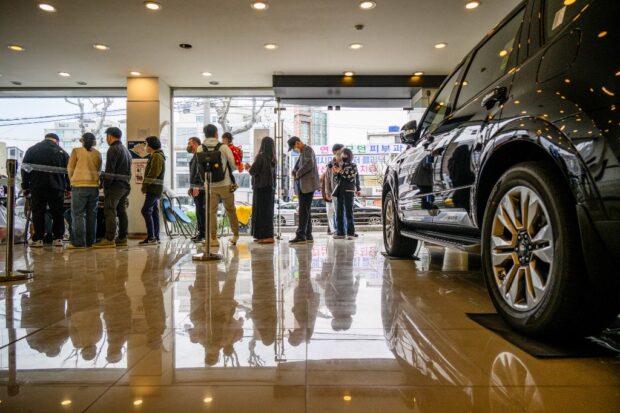Yoon faces rebuke in slugfest South Korea vote

South Koreans cast their ballots during the parliamentary elections at a polling station located in a baseball training center of an elementary school in Seoul on April 10, 2024. South Koreans began voting on April 10 in parliamentary elections seen as a referendum on President Yoon Suk Yeol after a polarising campaign focused largely on resentment, personalities — and onions. (Photo by Jung Yeon-je / AFP)
Seoul, South Korea — South Korean President Yoon Suk Yeol faced a reckoning from voters Wednesday in parliamentary elections seen as a referendum on his rule following a campaign that skirted many of the country’s real problems.
Instead, Yoon and main opponent Lee Jae-myung — survivor of a knife attack and myriad scandals — have sparred in a slugfest that could boost a new upstart party and further turn off young voters in the nation of 51 million people.
READ: South Korea polls issues: Green onions, apples, striking doctors
Yoon beat Lee in South Korea’s closest presidential election in 2022 and has taken a tough line with the nuclear-armed North while improving ties with Washington and former colonial occupier Japan.
But Lee, while fending off a slew of graft probes he says are politically motivated, is now eyeing revenge, hoping to boost the parliamentary majority of his Democratic Party (DP) — potentially by enough to impeach Yoon.
“Please give us a minimum number of seats that we can use to keep this immoral and shameless opposition in check,” Han Dong-hoon, head of Yoon’s People Power Party (PPP), said on the eve of the poll.
“Please vote to prevent the political force that has betrayed the people from attaining a parliamentary majority,” said Lee.
READ: South Korea’s first lady avoids limelight ahead of high-stakes election
From the start of his presidency, Yoon has been unpopular, with ratings hitting the low 30s, and the PPP’s lack of control of the National Assembly has stymied his socially conservative legislative agenda.
This includes planned healthcare reforms — that are backed by voters but have sparked a crippling strike by doctors — and a pledge to abolish the ministry of gender equality.
“Hopefully the next parliament will prioritize people’s lives above all else,” health activist Kim Sung-ju, 61, told AFP.

People queue to vote at a car showroom being used as a polling station in Seoul on April 10, 2024, during the parliamentary elections. South Koreans began voting on April 10 in parliamentary elections seen as a referendum on President Yoon Suk Yeol after a polarising campaign focused largely on resentment, personalities — and onions. (Photo by Anthony WALLACE / AFP)
No babies
On Yoon’s side are shifting demographics, with voters aged 60 and older now outnumbering those in both their 20s and 30s in a country with the world’s lowest birth rate.
“Voters over 60 represent a formidable and staunchly conservative base for Yoon,” Sharon Yoon, a Korean studies professor at the University of Notre Dame, told AFP.
Younger Koreans are less likely to vote at all, with many saying they are put off by a political class dominated by older men who ignore their concerns.
Many say this was underlined by the horrific 2022 Halloween crowd crush in Seoul that killed more than 150 mostly young people.
The younger generation is also struggling economically, with cut-throat competition in education, fewer job opportunities and sky-high housing costs.
“There is definitely less interest in this election among the people around me than last time. I think it is because they feel rather disappointed,” business owner Kim Yong-ho, 24, said outside a polling station in Seoul’s Gwangjin district.
The tone of the campaigning has also put many voters off, lacking in substantive policy debate and marked instead by shrill calls to “imprison” Lee or “punish” Yoon.
“I am truly ashamed of our country’s politics and government,” Kim Do-kyung, 47, an activist for migrant women and their children, told AFP.
This has been accompanied by hate speech and disinformation online that experts worry could lead to more attacks like the one on Lee in January and another weeks later.
‘Dead duck’
Capitalizing has been a new party, Rebuilding Korea, led by former justice minister Cho Kuk, who is also facing jail time for corruption charges that he denies.
While Cho Kuk’s party is offering few substantive policies of its own, polling data showed it neck-and-neck with the PPP, meaning it could play kingmaker in the new parliament.
“I am going to make President Yoon first a lame duck, then a dead duck,” Cho told AFP earlier this month.
The DP favours a less hawkish approach towards Pyongyang, and Lee has made a number of pro-China remarks. One doctored video showed him bowing to a statue of Mao Zedong.
It has also latched onto a gaffe by Yoon last month about the “reasonable” cost of green onions, a staple in Korean cooking that has soared in price.
The humble vegetable became a popular prop at DP rallies, and the election commission even banned voters from bringing them to polling stations.
Jeremiah Shim, 40, a pastor, said people in his congregation are finding it harder to get by because of rising food prices.
“I support (Lee). His history and life journey are very impressive. Many people think he can change our future,” Shim told AFP at a DP rally.
Voting ends at 6:00 pm (0900 GMT) with exit polls soon afterwards followed later by the first results.